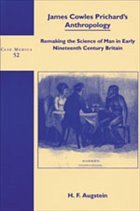The Bristol doctor James Cowles Prichard (1786-1848) has enjoyed a glowing reputation. Late Victorians regarded him as the founder of British anthropology and, in the twentieth century, he has been considered as a precursor of Darwin. Nowadays his name is cited mainly in context of inquiries into the rise of racial theories.
Prichard's own theoretical goal was simple: the son of Quaker parents, he attempted to establish that the Bible provided a correct account of the earliest history of humankind; above all it was his aim to prove once and for all the doctrine of monogenesis: the unitary origins of mankind. He single-handedly charted the waters of the pre-Victorian human sciences. Philology, anthropology, mythology, Biblical criticism, the philosophy of the human mind, comparative anatomy, physiology, and practical medicine - Prichard mastered subjects so diverse that his learning may be called truly universal. His views have often been misrepresented, however, and his opposition to racial thinking in particular has been underestimated. This book, the first study dedicated exclusively to Prichard, explores his notions of man's place in nature and puts them in the context of contemporary European learning.
Table of contents:
Acknowledgements. Introduction. 1 The Life of James Cowles Prichard. 2 Moral Insanity: A Medical Theory of the Corruption of Human Nature. 3 Physical Anthropology: Natural Similarity. 4 Environmentalism and Heredity: Natural Variety. 5 The Third Calling: Ethnology or The Unity of Mankind in Time and Space. 6 Linguistics and Politics in the Early Nineteenth Century: Prichard's Moral Philology. 7 The Uses of Mythology for the Study of History. 8 Conclusion: Prichard's After-life. Bibliography. Index.
Prichard's own theoretical goal was simple: the son of Quaker parents, he attempted to establish that the Bible provided a correct account of the earliest history of humankind; above all it was his aim to prove once and for all the doctrine of monogenesis: the unitary origins of mankind. He single-handedly charted the waters of the pre-Victorian human sciences. Philology, anthropology, mythology, Biblical criticism, the philosophy of the human mind, comparative anatomy, physiology, and practical medicine - Prichard mastered subjects so diverse that his learning may be called truly universal. His views have often been misrepresented, however, and his opposition to racial thinking in particular has been underestimated. This book, the first study dedicated exclusively to Prichard, explores his notions of man's place in nature and puts them in the context of contemporary European learning.
Table of contents:
Acknowledgements. Introduction. 1 The Life of James Cowles Prichard. 2 Moral Insanity: A Medical Theory of the Corruption of Human Nature. 3 Physical Anthropology: Natural Similarity. 4 Environmentalism and Heredity: Natural Variety. 5 The Third Calling: Ethnology or The Unity of Mankind in Time and Space. 6 Linguistics and Politics in the Early Nineteenth Century: Prichard's Moral Philology. 7 The Uses of Mythology for the Study of History. 8 Conclusion: Prichard's After-life. Bibliography. Index.

